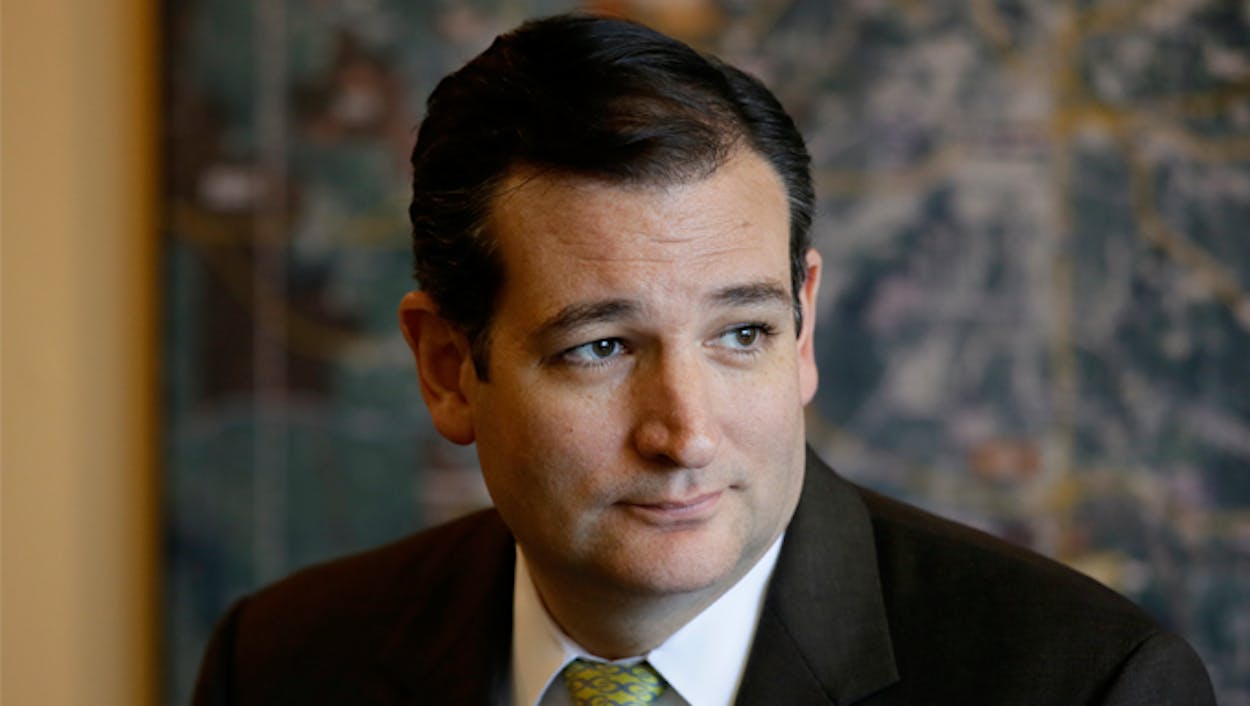A journalist covering politics is bound to spend any presidential election cycle running an ad hoc straw poll of sorts. Since March, in other words, I’ve heard more about Ted Cruz than I care to remember, and over the past week I’ve sensed a shift in public opinion concerning his prospects.
Throughout the race Cruz has elicited a fair amount of media coverage and a lot of heated commentary from politics fans. During the spring and summer that seemed to be a measure of how controversial he had become after less than three years in national politics, because the amount of attention he received was wildly disproportionate to his perceived prospects. According to my straw poll, hardly anyone thought he had a good chance of being the party’s nominee. Many respondents were vehemently opposed to the idea that anyone could possibly think so. But about two months ago, the scoffing started to abate, probably because the 2016 Republican primary had started to seem like a bag of cats in a clown car. As of a month or so ago, I was frequently hearing that the Republican field will eventually narrow to a two-man fight between Marco Rubio and Cruz.
And just in the past week I’ve noticed an abrupt uptick in the number of people who believe that Cruz will be the Republican nominee. Concurrently, there’s been a sharp decline in the number of people insisting that the idea of Cruz being the nominee is unthinkable.
Obviously, my straw poll is a highly unscientific exercise and the results described above aren’t consistent with the most recent findings in more scientific exercises. PredictWise, for example, gives Rubio a 44 percent chance of winning the nomination, followed by Trump at 22 percent and Cruz at 16 percent. Real polls suggest that Cruz is gaining momentum nationwide—in the past month his support has roughly doubled, from 7 percent to 13 percent, and the new Quinnipiac poll, released this morning, had him at 16 percent—but that puts him in only fourth place behind Trump, Carson, and Rubio. And though Carson’s star appears to be fading, Trump remains a surprisingly resilient obstacle to all the other candidates—in addition to being a threat to the credibility of the party, and a pox on America’s political discourse. Jonathan Martin, writing yesterday in the New York Times, reports that the Republican establishment isn’t even sure what to do at this point: “Irritation is giving way to panic as it becomes increasingly plausible that Mr. Trump could be the party’s standard-bearer and imperil the careers of other Republicans.”
Cruz also continues to face more fierce opposition from his fellow Republicans than most of his rivals for the nomination, including the one widely presumed to be his counterpart in the final showdown. Burgess Everett and Seung Min Kim of Politico Magazine report that a number of Republicans in Congress are preparing to publicly announce their support for Rubio: “The idea of Cruz as the nominee is enough to send shudders down the spines of most Senate Republicans.” Some Republican operatives told Martin that they are reluctant to go after Trump for the time being; their reasoning is that Trump is preventing Cruz, “an even less-desirable standard-bearer,” from amassing more support.
On the other hand, this ferocious GOP opposition to Cruz reflects an apparently widespread premise that someone has to stop him because otherwise he might win. So I’ll note one more finding from my completely unscientific straw poll: in the past week I’ve heard a couple of Republicans predict, confidently though not publicly, that Cruz will be the next president. That’s currently considered far-fetched, obviously, and Democrats may be right to scoff at the suggestion. But more relevant in the short term is whether Republicans are starting to believe that, because Cruz’s ability to win the nomination may depend on his perceived electability. As it stands, Rubio is considered a far stronger general election candidate, while many pundits consider Cruz unelectable in November 2016; two people had emailed me this Frank Bruni broadside before I finished my coffee this morning.
For my part, I think it’s unwise to underestimate Cruz’s chances in a general election. Given that his goal is to become president and he’s the guy who currently has a staffer corralling delegates in Guam, we can take it as given that he knows there’s this additional, post-primary hurdle and is planning accordingly. And Cruz’s reputation as a right-wing bomb thrower may even work to his advantage if he makes it that far; considering the sweeping contempt and loathing that his campaign has inspired thus far, the candidate himself might seem not that bad in comparison.
Still, since he never ran for office before 2012, and that was a statewide election in Texas, Cruz has no record of winning a competitive general election. So rather than making any predictions I’ll just offer a warning for readers who are sick of reading about Ted Cruz: I understand. But it’s gonna get worse.







